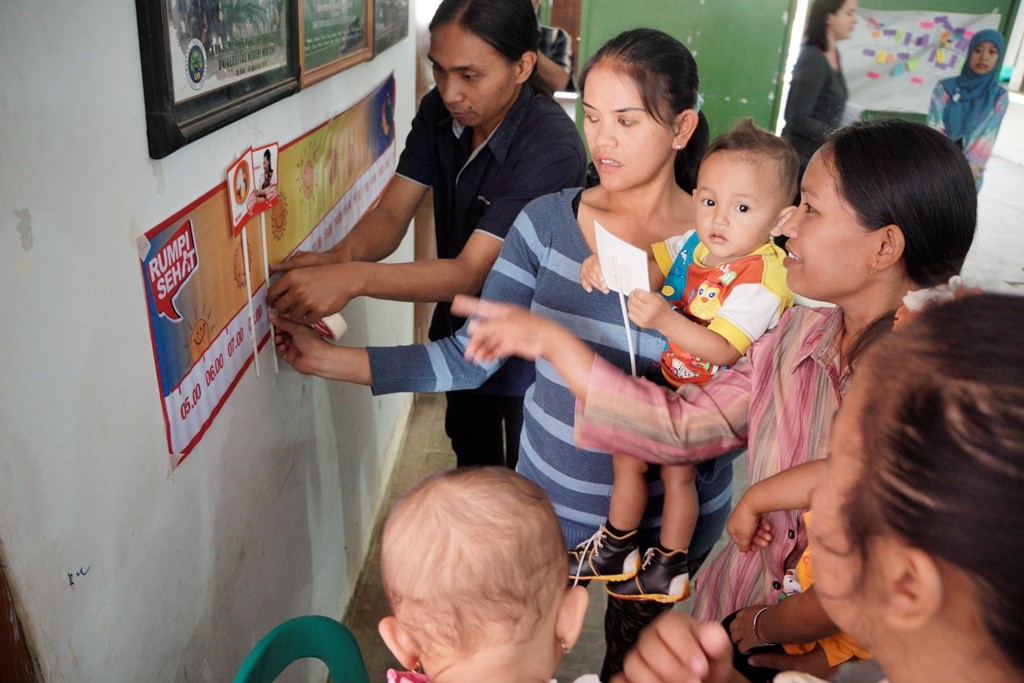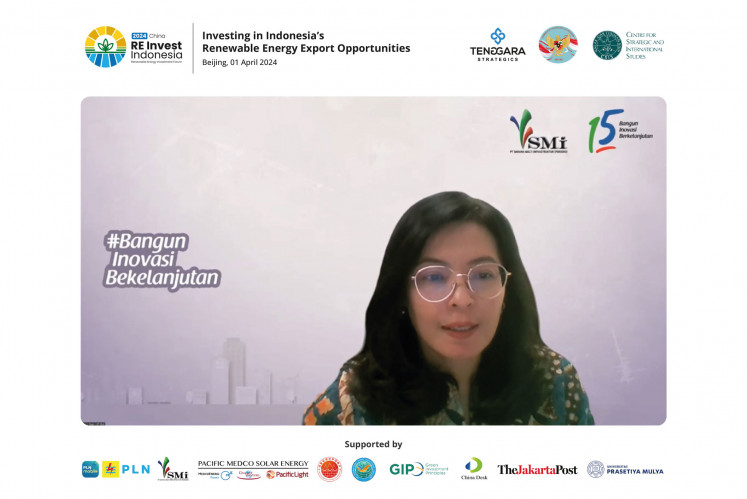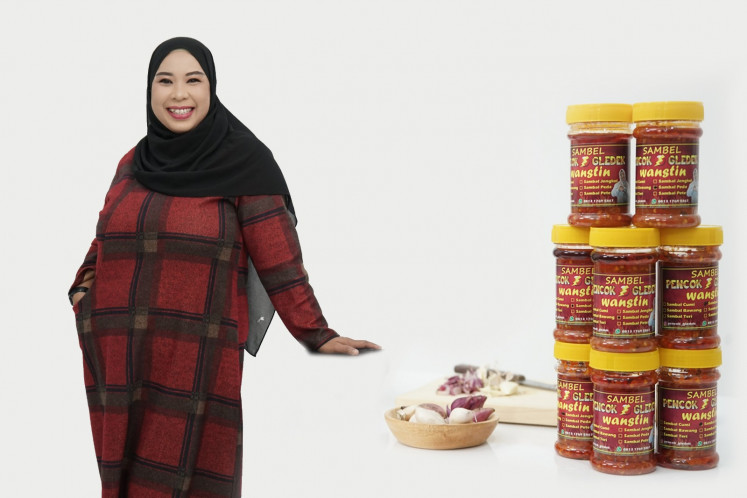Good nutrition entails safe drinking water
There is a direct correlation between safe drinking water and health, especially when linked to the national agenda, called the National Movement for the First 1,000 Days of Life (Gerakan 1000HPK).
Change Size
 Scheduling: Mothers learn about feeding timelines for their children in an integrated health service post, Posyandu in East Java. (Courtesy of GAIN/-)
Scheduling: Mothers learn about feeding timelines for their children in an integrated health service post, Posyandu in East Java. (Courtesy of GAIN/-)
S
em>Switzerland headquartered Global Alliance for Improved Nutrition (GAIN) in collaboration with the Ministry of Health and PT Holand for Water are working towards improving nutrition in the first 1,000 days of a child’s life in East Java under the Baduta Program, which has access to safe drinking water as one of four program components
There is a direct correlation between safe drinking water and health, especially when linked to the national agenda, called the National Movement for the First 1,000 Days of Life (Gerakan 1000HPK).
“People often did not realize the negative effects unsafe water has on their health, until they or their children get a disease, such as diarrhea. The issue of people’s inability to have access to safe drinking water should be tackled properly because otherwise it may affect the government’s efforts to reduce stunting and improve the health of the next generation” said Ravi Menon, GAIN's Country Manager for Indonesia.
In 2008, the World Health Organization estimated that 50 percent of malnutrition cases worldwide were associated with repeated diarrhea or intestinal infections caused by unsafe water and inadequate hygiene.
“Eight years later these rates might have dipped, but they largely hold true in any country where pregnant women and children do not have ‘on-tap’ access to clean drinking water,” “We can try to make families change their eating behavior, the government can ensure that foods are correctly fortified and formulated, while the private sector can make sure that they are affordable,”
“But everything comes to nought if the child is affected by diarrhea caused by drinking unsafe water or because of food prepared using boiled water that is re-contaminated due to improper storage,” Menon said.
This is why GAIN decided to integrate access to safe drinking water into their ongoing Baduta Program.
Integrated Nutrition program
GAIN, a Swiss non-profit technical agency with offices in 17 countries, including Indonesia, signed a memorandum of understanding with the Ministry of Health to support the 1,000 Days of Life Movement by bringing what it had learned globally and incorporating it in the Baduta Program.
The signing was conducted two years ago not long after the government announced its intention to reduce the incidence of stunting and improve the health of the next generation through the Gerakan 1000HPK .
The Baduta Program aims to improve the nutrition status of pregnant women and children aged 6 to 24 months and to show progress on key indicators that contribute to reducing stunting.
40,000 pregnant women and 60,000 mothers and caregivers of children under 2 are expected to participate in intensive program activities at the community level.
The program kicked off in October 2013 and will last until June 2017, with six sub- districts of Malang and Sidoarjo, in the East Java province, being the program areas.
According to Menon, GAIN raises funds internationally and channels them to local implementing agencies. “The primary donor for the Baduta Program is the Kingdom of the Netherlands,” he said.
“At the outset, we had extensive discussions with the Health Ministry and the district health offices to fully understand where we could add value, without replicating what they were doing,”
“In the end we designed an integrated program with nutrition-specific and nutrition-sensitive components.”
The program has three nutrition-specific components: behavior change in eating habits, capacity building of nutrition knowledge and breastfeeding counseling at Puskesmas, village midwife, and Posyandu levels and providing technical support to review packaging of complementary foods to make them internationally compliant.
“The nutrition-sensitive interventions we have chosen are providing water filters and delivering hand-washing messages to the target areas.”
“GAIN outlined the design for each component and then went through an exhaustive process to select three organizations, namely Save the Children, Yayasan Paramitra and PT Holland for Water that manufactures Nazava Water Filters, to implement them,” he said.
Behavior change component
Promoting community level behavioral changes in maternal eating habits and feeding of young children is a major part of the Baduta Program. This involved the development of four television commercials under the tag-line ‘Rumpi Sehat’ (Healthy Gossip) and developing Emo-Demo games linked to each of the four behaviors highlighted in the TV commercials. “The Emo-Demo technique of triggering emotions associated with behaviors was pioneered by the London School of Hygiene and Tropical Medicine (LSHTM) for hand-washing programs.”
For the Baduta program, GAIN worked with LSHTM to develop 11 new emo demos especially for nutrition behavior and the response from the community has been overwhelmingly positive.
“Kaders (Village cadres) are thrilled that they have a new instruction technique that has enthused mothers and attendance at monthly Posyandus has swelled. Entire communities are seen to be supporting each other to practice these behaviors through what the implementers have named the Gerakan Rumpi Sehat,” Menon said.
Safe drinking water component
The Baduta Program encourages the establishment of a sustainable supply chain of household drinking water filters, community water assessment and education on appropriate household water treatment and safe storage.
Nazava Water Filters (PT Holland for Water), is piloting a micro-entrepreneurship model for the distribution of community water filters. These entrepreneurs, the majority of whom are women with no previous business background, are taught the importance of safe drinking water, the cost savings of filtering versus boiling, and how to assemble and maintain water filters. The GAIN funds allow for these women to receive a small stock of filters and then sell them in installments that are affordable in their community.
“GAIN did not want program funds to be used to provide free equipment because we know from experience that anything given for free has little or no value to recipients who eventually stop using that item. Hence we really liked Nazava’s proposal to sell the filters in affordable long-term installments and set up a livelihood program which would empower women” said Menon
“Nazava has reported that early customers have started buying replacement candles which proves to us that the filters are actually being used , which is very good news ” he said.
Meanwhile, Nazava’s director and co-founder Guido van Hofwegen said that what is innovative about the Baduta Program is that perhaps for the first time in Indonesia, nutrition and access to safe drinking water are combined within one project.
“Most projects focusing on nutrition underestimate the importance of safe drinking water, which means that fortified foods and extra nutritional supplements become ineffective if the consumer continues to drink contaminated water and gets diarrhea, flushing away all the nutrition,” he said.
Ensuring that filtered water is safe to drink, he explained that the core elements of the Nazava Water Filter is a filter candle made of ceramic and filled with activated carbon and mixed with silver.
“The Nazava Water Filter works like a sieve but with holes that are a thousand times smaller,” he said.
“The pores in the filter are so small (0.4 micrometer/micron) that bacteria (0.5 micrometer/micron) cannot pass,” he explained.
“So the filtered water is free of bacteria,” he adds.
To reach out to rural consumers, the company works together with the district health departments. “We team up with Community Health Centers (Puskesmas) to educate women how to make water safe to drink and how to store drinking water properly,” he said.
To date, the company serves 47,000 households, reaching almost 250,000 people through more than 120 safe water entrepreneurs in Indonesia alone. It also exports to other Asian and African countries.
Sustainability
The evaluation of the Baduta Program will end in June 2017 and GAIN is preparing to make the program sustainable.
“Sustainability is built into our program because every aspect has been designed based on government direction. The most expensive parts of the process have already been done – the formative research, the TVC production, the emo-demo development, testing and the legal research into changing regulations.”
“The Ministry of Health will evaluate the program this year and then decide if it is worth replicating and scaling up, either as a whole or in parts, in which case they will issue new national guidelines. It is a long process but in the end will ensure the program's sustainability,” Menon said.
According to van Hofwegen, Nazava is building a sustainable supply chain for water filters in the Baduta program areas. “It is sustainable because we work with entrepreneurs who will keep on selling filters after the program is finished,” he said. (Sudibyo M. Wiradji)









